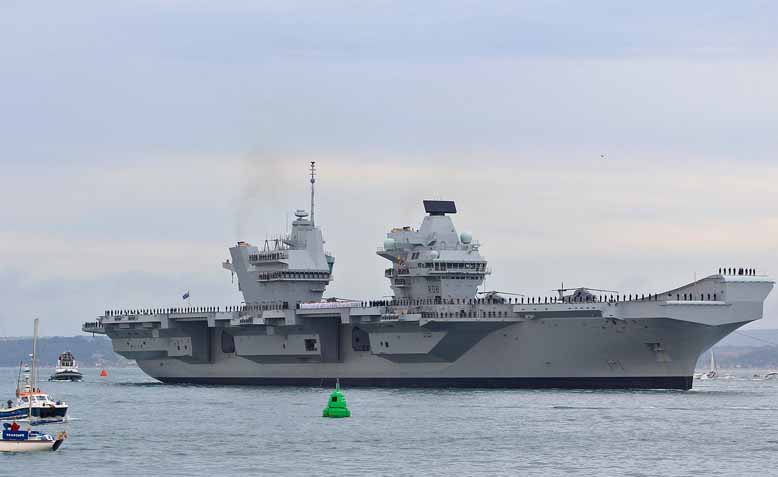 HMS Queen Elizabeth (R08) entering Portsmouth Naval Base on her delivery voyage 16 August 2017. Photo: Brian Burnell
HMS Queen Elizabeth (R08) entering Portsmouth Naval Base on her delivery voyage 16 August 2017. Photo: Brian Burnell
As the British state’s new aircraft carrier, worth billions of pounds, springs a leak, Lindsey German takes a look at the war games being played
This month saw the launch of one of the biggest white elephants in British history. The aircraft carrier Queen Elizabeth is costing, along with its sister ship the Prince of Wales, a total of £6.2 billion. These giant floating air bases are designed to give support for more wars. They will be deployed in the Middle East and the Pacific, increasingly the flashpoint for new wars, where they will facilitate possible intervention in Iran, North Korea, Syria and the horn of Africa. One snag in all this is that they don’t have aircraft at the moment and are not going to get any until 2021. Even then, the ships will not have their full complement because each F35 fighter jet costs £100m.
Meanwhile, the streets of British cities are filled with homeless people, use of food banks is increasing and levels of inequality have reached record levels. But at least Britannia can still pretend it rules the waves, and that it has a decisive military role to play.
This fiction is central to Tory ideology, and also important to the pro-imperialist wing of Labour. It protects military spending, which continues at obscene levels. It also helps foster nationalist and militarist ideas.
Meanwhile defence minister Gavin Williamson, who was among the guests of honour at the 3,700 person launching ceremony, also chose today to declare open season on those who went to fight for Isis in Iraq and Syria. He was quoted by the Daily Mail as saying ‘Quite simply, my view is a dead terrorist can’t cause any harm to Britain.’ Williamson also said ‘I do not believe that any terrorist, whether they come from this country or any other, should ever be allowed back into this country.’
One Tory minister advocating the killing of British citizens who fought for Isis might be random. But his predecessor Michael Fallon used similar language, calling them a ‘legitimate target’. And back in September another minister, Rory Stewart, said that in almost every case the way to deal with British born ISIS fighters was to kill them.
One has to assume both that when three ministers say this, it is policy, and policy which they are happy to publicise. It may play well in the Mail or Express, but it is both a brutalising policy, likely to lead to further terrorism and instability, and one of dubious legality. Shocking though it might be to Tory ministers, it is not ok to just go around assassinating people outside the normal rules of war. In fact, it is against international law, unless there is immunity through declaration of war or the right to immediate self defence.
The use of drone warfare – the usual means of carrying out such killings – is now a major part of western military intervention in the Middle East, Afghanistan and Pakistan. Such warfare makes wars appear relatively cost free to the west in terms of its own casualties. But it is far from cost free in terms of the instability and growth of terrorism to which it often leads.

